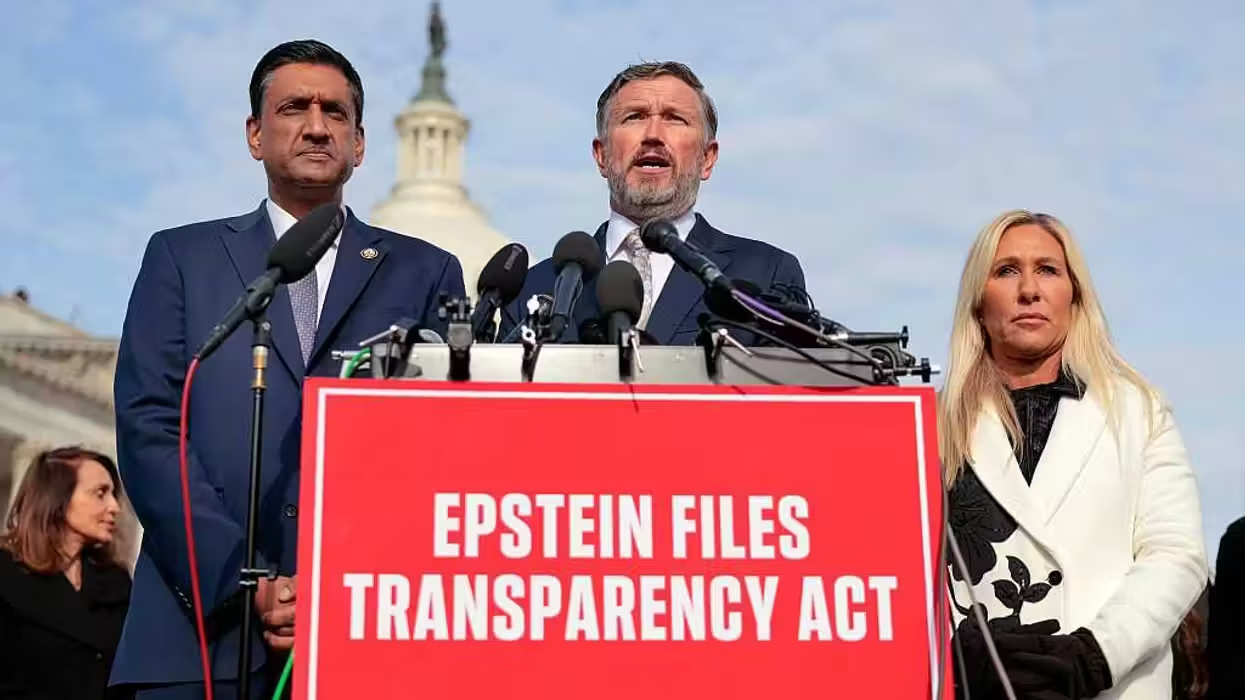
© 2025 Blaze Media LLC. All rights reserved.
It took three decades to partially right a great wrong.
In chapter 9 of Miracles and Massacres, Glenn Beck’s latest book, we learn the story of Iva Toguri, aka Tokyo Rose, an American citizen whose life was ruined during World War II after she was prosecuted as a traitor in a political decision made by the U.S. government. One aspect of the story that was left out of the book was how Toguri’s pardoning in 1977 – the last act of President Gerald Ford’s administration, almost three decades after initially being charged as a traitor – came to pass.
In a Blaze Books exclusive, we spoke with Ronald Yates, a former Chicago Tribune journalist, who was responsible for publishing the exposés in 1976 that ultimately helped Iva Toguri gain her pardon, and one of only a handful of people who became a close personal acquaintance with Toguri in her later years. This is our second story in a series based on our interview with him. If you missed it, be sure to check out Part I here.
Ronald Yates had come upon an Earth-shattering discovery nearly three decades after the lies had been told: Iva Toguri, Tokyo Rose, had been wrongfully accused and convicted of treason. An American-born Japanese woman had been branded a traitor, spent over six years in prison, been separated from her husband, Felipe D’Aquino who had stayed behind in Japan, afraid to return to the country, and been left to try and pick up the pieces of her life without the truth ever being exposed to the light of day.
 Iva Toguri pictured on 17 March, 1948. (Image Source: National Archives)
Iva Toguri pictured on 17 March, 1948. (Image Source: National Archives)
In 1976, Yates wrote a series of newspaper articles for the Chicago Tribune on his findings. I asked him what the impetus was for writing the stories. Yates responded without any sign of hesitation:
“I felt that she had been wronged. First of all she had been wronged by journalism, two journalists [Harry] Brundidge and [Clark] Lee interviewed her in Tokyo and treated her really badly…Lee wrote this horrible story that she had been a traitor to her country for something like $6 a month…and Brundidge, he filed a story to Cosmpolitan magazine and they rejected it, saying there was no story there because there was no evidence that she had done anything and they didn’t like the story.”
In addition to his belief in righting a wrong, Ronald Yates exhibited an admirable trait: He believed in journalistic integrity. The efforts of Brundidge and Lee completely offended his sensibilities as someone who sought to reveal truth. As Yates notes:
“There was nothing in there [Brundidge and Lee’s reports] that was condemning really, but the fact that these people, these two journalists had done this to her really bothered me. Don’t forget this is not long after Watergate and so there was a sense of crusading, and I felt it was incumbent upon me having heard this from these two men that I do something to right this wrong.”
[sharequote align="center"]I just knew that this wasn’t right and I needed to write something about it.[/sharequote]
I was curious as to whether or not there had been any other concerted effort to try to vindicate Iva Toguri. Yates was not collaborating with folks seeking a pardon – he was merely seeking to set the record straight and bring justice to Iva Toguri at long last:
“I wasn’t that familiar with the pardon campaign that was underway on her behalf, but I just knew that this wasn’t right and I needed to write something about it. I remember I talked to my foreign editor from the Tribune at the time, and I said this is a story we have to do. She lived in Chicago. She was screwed by the government. Her testimony, her conviction was based on this perjured testimony by these two guys who had confessed to me that they had lied at her trial. ‘We need to write something about it.’ And they said ‘Absolutely, go for it.’ And I did it.”
 A newspaper clipping from one of Ronald Yates' Chicago Tribune articles dated 23 March, 1976, titled "Tokyo Rose 'just a scapegoat': husband." (Image Source: Proquest Historical Newspapers Chicago Tribune (1849 - 1986))
A newspaper clipping from one of Ronald Yates' Chicago Tribune articles dated 23 March, 1976, titled "Tokyo Rose 'just a scapegoat': husband." (Image Source: Proquest Historical Newspapers Chicago Tribune (1849 - 1986))
So Yates wrote up a series of stories in March of 1976, detailing his interviews with Mitsushio and Oki who had confessed to their perjured testimony, Toguri’s estranged husband, Felipe D’Aquino, who said she was “just a scapegoat,” and various other who had worked with Toguri in Japan including most notably Japanese Colonel Shigetsugu Tsuneishi, a radio propagandist in the Imperial Japanese Army who oversaw shows including the “Zero Hour,” on which Toguri worked, further corroborating the stories of the others.
Yates’ articles made it out to over 30 million people across the world. As Yates describes it: “…that was going ‘viral’ in those days.”
 A young Ronald Yates. (Image Source: Amazon)
A young Ronald Yates. (Image Source: Amazon)
Several weeks later, Ronald Yates got a call from the White House, asking if Mitsushio and Oki had actually confessed, if Yates (still stationed in Tokyo) would be willing to meet with them, and if Yates knew if Mitsushio and Oki would confirm their stories with U.S. government officials. Yates complied, and the U.S. government undertook an investigation of his story, ultimately turning over their findings to the White House.
Simultaneously, according to Yates, during the
“…late ‘70s and early ‘80s…there was a huge push for Japanese reparations. The Japanese Americans who were thrown into these detention camps, during the war, they lost their property. They lost houses, they lost boats, they lost everything that they had…their farms. So there was a push for reparations and I think eventually it came out that everyone who was interned in this way would receive something like $30 or $35,000. So Iva’s push for her pardon kind of coincided with this whole furor over the reparations movement on the part of Japanese Americans, and that kind of helped it. But it didn’t go anywhere, nothing could push it over the edge until those stories appeared and these two guys told me that they had lied.”
Yates’ stories also prompted 60 Minutes to spring into action. Subsequent to Yates publishing his stories and U.S. officials conducting their investigation on Yates’ findings, Yates received a call from Bill Kurtis, a Chicago native, on behalf of the show. Morley Safer had asked Kurtis to contact Yates to discuss his stories. Kurtis, literally the only other media figure to have known Iva given her reclusiveness, then convinced Iva to participate in an interview with Safer on 60 Minutes.
As the last official act of his tenure, President Ford pardoned Iva Toguri on January 19, 1977.
--
Next in our series: Iva Toguri, the person, and a meeting with Yates almost three decades in the making.
Want to leave a tip?
We answer to you. Help keep our content free of advertisers and big tech censorship by leaving a tip today.
Want to join the conversation?
Already a subscriber?
Ben Weingarten is a writer, commentator, and editor at large at RealClearInvestigations. He is a senior contributor at the Federalist and writes columns for Newsweek and the Epoch Times.
Ben Weingarten
Ben Weingarten is a writer, commentator, and editor at large at RealClearInvestigations. He is a senior contributor at the Federalist and writes columns for Newsweek and the Epoch Times.
more stories
Sign up for the Blaze newsletter
By signing up, you agree to our Privacy Policy and Terms of Use, and agree to receive content that may sometimes include advertisements. You may opt out at any time.
Related Content
© 2025 Blaze Media LLC. All rights reserved.
Get the stories that matter most delivered directly to your inbox.
By signing up, you agree to our Privacy Policy and Terms of Use, and agree to receive content that may sometimes include advertisements. You may opt out at any time.






